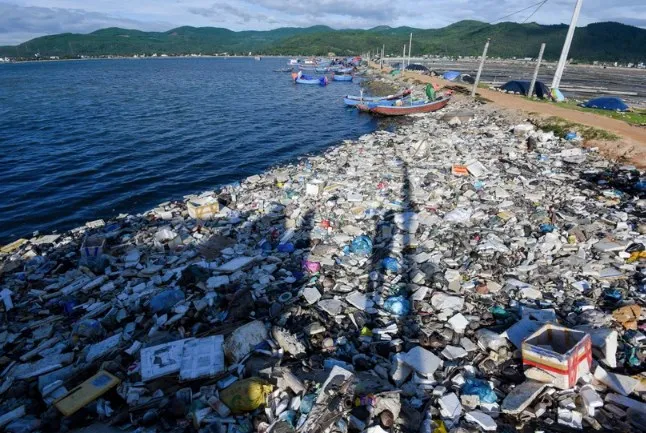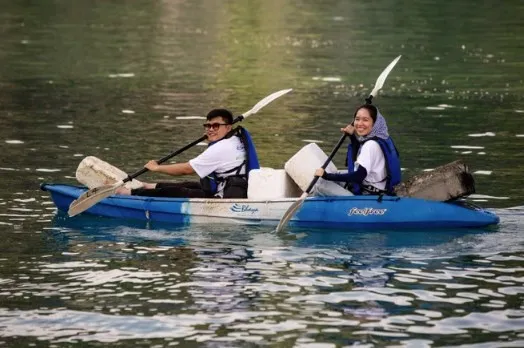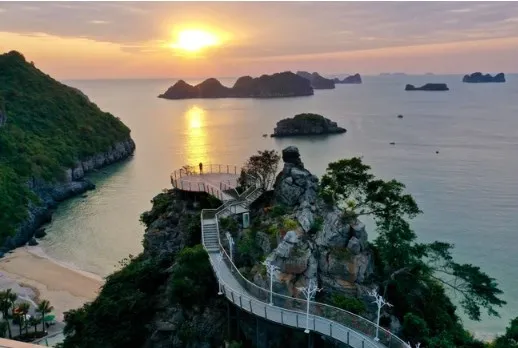Have you ever set foot on a beautiful beach, only to witness the scene of plastic waste overflowing, disrupting the inherent natural beauty? Or felt heartbroken as gentle waves carry countless plastic bottles and nylon bags to the shore? That is the alarming reality of the tourism industry today, where the amount of waste, especially plastic waste, is increasing, threatening the environment and the sustainable development of the tourism industry itself. But don’t worry, because each of us can contribute to changing this situation by choosing zero-waste travel experiences, a trend that is increasingly popular and spreading strongly.
The Alarming Reality of Plastic Waste in the Tourism Industry
The tourism industry is considered one of the key economic sectors, bringing in substantial revenue and creating jobs for millions of people. However, alongside economic benefits, tourism also causes significant impacts on the environment, especially the issue of plastic waste.
According to statistics, millions of tons of plastic waste are discharged into the marine environment each year, and a significant portion of that originates from tourism activities. From luxury resorts to roadside eateries, from individual tourists to large tour groups, plastic waste appears everywhere: water bottles, straws, nylon bags, single-use food containers, plastic personal care items, and more.

Beaches filled with plastic waste not only detract from natural beauty, pollute the marine environment, and affect ecosystems and marine life, but also directly impact the tourist experience. No one wants to visit a beach full of trash to relax and unwind. This not only causes economic damage to the tourism industry but also affects the image and brand of national tourism.
Therefore, reducing plastic waste in the tourism industry is not only the responsibility of state management agencies and tourism businesses but also the responsibility of each tourist. We need to join hands to protect the environment, towards a greener and more sustainable tourism industry.
Vietnam Tourism Association Pioneering Zero-Waste Tourism Actions
Faced with the alarming situation of plastic waste and recognizing the importance of environmental protection for the sustainable development of the tourism industry, the Vietnam Tourism Association (VITA) has proactively initiated and implemented many practical activities to reduce plastic waste in the tourism sector.
As early as 2018, VITA launched the movement “Vietnam Tourism – Joining Hands to Reduce Plastic Waste,” calling for the response and participation of tourism businesses nationwide. The movement has received positive responses from the business community, with many models and initiatives to reduce plastic waste being effectively implemented in localities and tourist establishments.
Continuing these efforts, VITA continues to collaborate with the United Nations Development Programme (UNDP) to implement the project “Reducing Plastic Waste in Vietnam’s Tourism Sector” for the period 2023-2024. The project focuses on developing and issuing an Action Plan on reducing plastic waste in the tourism industry, creating a legal basis and orientation for plastic waste reduction activities in a systematic and effective manner.
This Action Plan includes many key tasks, such as: raising awareness about the harmful effects of plastic waste and the importance of zero-waste tourism; developing and monitoring policies on plastic waste management in tourism; developing green, environmentally friendly tourism products; promoting tourism associated with plastic waste reduction; training and fostering knowledge about zero-waste tourism; and mobilizing international resources for plastic waste reduction activities.
Detailed Action Plan and Targets for 2025 & 2030
With the Action Plan for reducing plastic waste in the tourism industry, the Vietnam Tourism Association sets specific and ambitious goals, towards a future of tourism without plastic waste.
By 2025, VITA strives for 100% of its member units to be educated about the harmful effects of plastic waste and the importance of reducing plastic waste. At the same time, 50% of members who are tourist areas and hotels will stop using non-biodegradable nylon bags and single-use plastic products.
By 2030, a higher goal is set: 100% of VITA members will not use non-biodegradable nylon bags and single-use plastic products. This is a significant step forward, demonstrating the strong determination of Vietnam’s tourism industry in addressing the plastic waste problem and moving towards sustainable development.
To achieve these goals, VITA has been implementing synchronized solutions, from advocacy and mobilization to policy development and support for businesses and communities to implement plastic waste reduction measures.

In addition, VITA also proposes applying a set of criteria to recognize zero-plastic-waste tourism businesses, to encourage and motivate businesses to actively participate in the plastic waste reduction process. This set of criteria will serve as a basis for evaluating and recognizing pioneering tourism businesses that lead in implementing plastic waste reduction solutions, thereby spreading good models and experiences throughout the industry.
Businesses and Community Unite for Zero-Waste Travel Experiences
To realize the goal of zero-waste tourism, the joint effort and close coordination between businesses, communities, and tourists are extremely important.
Tourism businesses play a key role in reducing plastic waste at the source. Hotels, resorts, restaurants, and travel companies can implement many practical solutions such as:
- Replacing single-use plastic items with environmentally friendly products: Using bamboo straws, paper straws, glass water bottles, personal care items made from natural materials, reusable food containers, etc.
- Minimizing the use of plastic packaging: Limiting the use of nylon bags, encouraging customers to bring their own bags when shopping, using paper or recycled packaging, etc.
- Sorting waste at source and recycling plastic waste: Placing waste sorting bins in public areas, hotel room areas, restaurants, organizing collection and recycling of plastic waste, etc.
- Raising awareness for employees and customers: Organizing training sessions for employees on zero-waste tourism, communicating to customers about the benefits of reducing plastic waste and encouraging them to participate, etc.
Local communities also play an important role in maintaining a green, clean, and beautiful tourism environment. People can participate in environmental sanitation activities, waste collection, tree planting, and preservation of natural landscapes.
And each tourist, with their awareness and responsibility, can make a big difference with small actions during their trip:
- Bring your own water bottle and personal items bag: Limit the use of single-use plastic bottles and nylon bags.
- Prioritize choosing green, environmentally friendly tourism products: Choose green hotels, restaurants using local ingredients, participate in eco-tours, etc.
- Do not litter indiscriminately and sort waste in the right place: Dispose of waste in trash cans, sort waste if possible.
- Actively participate in environmental protection activities at destinations: Participate in volunteer activities to clean up trash, plant trees, protect nature reserves, etc.
Call to Action and Vision for a Green Tourism Future
“Zero-waste tourism” is not just a slogan, but a practical action, an inevitable trend of the modern tourism industry. It is a harmonious combination of economic development and environmental protection, between travel experiences and responsibility to the community and the planet.

The Vietnam Tourism Association, with its pioneering role and unremitting efforts, is gradually realizing the vision of a green, clean, beautiful, and sustainable Vietnamese tourism industry. The Action Plan for reducing plastic waste is an important step, demonstrating the determination and commitment of the tourism industry in addressing environmental issues and moving towards sustainable development.
However, to achieve this goal, the joint effort and consensus of all stakeholders are needed: state management agencies, tourism businesses, local communities, and each tourist. Let’s act together, starting from the smallest things, to make zero-waste travel experiences an indispensable part of every trip, contributing to environmental protection and building a green tourism future for Vietnam and for the world.
Conclusion
Zero-waste travel experience is not just a trend but also our shared responsibility to protect the green planet. With the efforts of the Vietnam Tourism Association, the joint efforts of businesses and communities, and the awareness of each tourist, we can completely move towards a sustainable and plastic-waste-free tourism future. Let’s start acting today, for a green, clean, and beautiful Vietnam and a more beautiful world for future generations.